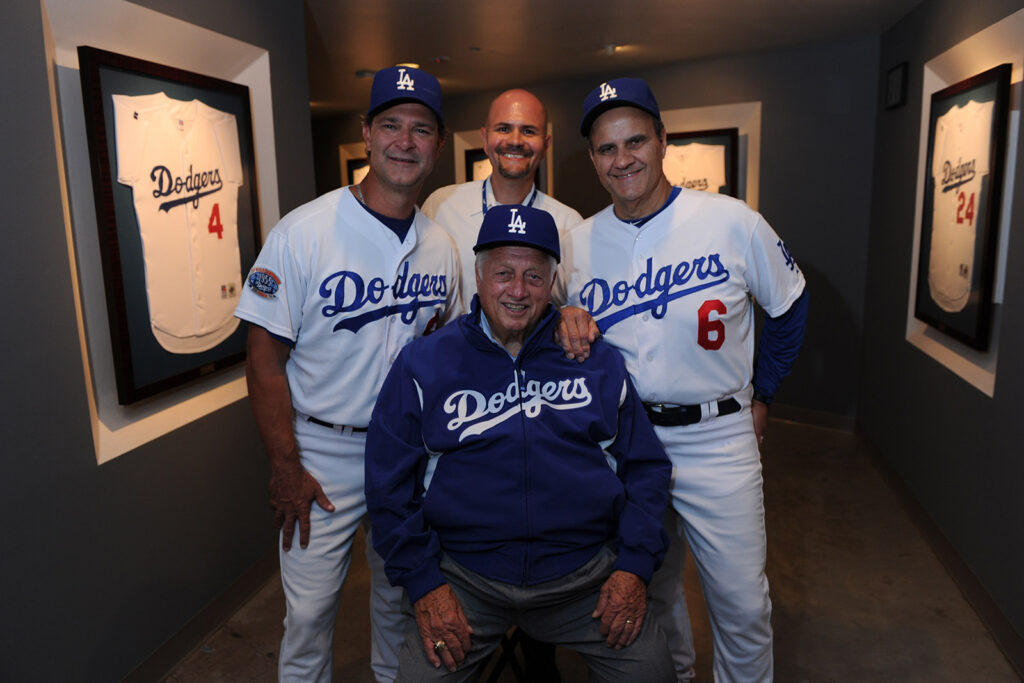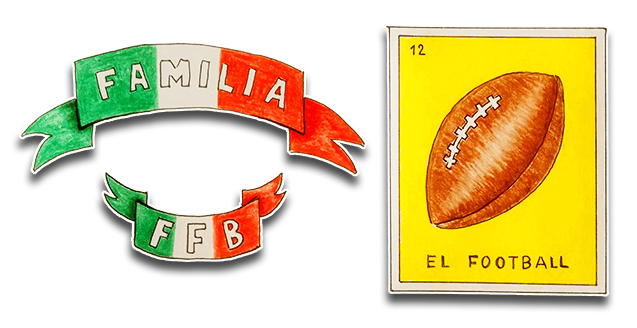When I got the news on the morning of Jan. 8 that the legendary Tommy Lasorda passed away at age 93, it was a major punch in the gut. More like a baseball bat to the forehead. This was another connection to my youth that was leaving our world, and even though I’d been bracing for it during his recent hospital stay, I still wasn’t ready to say goodbye to this man. You see, I grew up a Dodger fan, and I fell in love with the team and the game in 1977. That happened to be Lasorda’s first year managing the Dodgers. From the start, this was something special.

I grew up watching him, listening to his colorful interviews, seeing him in commercials and on guest appearances as the genie in the Baseball Bunch. I heard the bombastic spots on the Dodger pregame show. I bought in completely when Tommy talked about bleeding blue and loving the Dodgers above all else. The motivational lines and stories sometimes repeated, but I didn’t care. I saw the screaming, hugging and urging on his players. This all seemed normal to me. Didn’t Sparky Anderson, Chuck Tanner and Billy Martin do all these things, too? Over time I found out how different Tommy was. In fact, it was Joe Torre himself who once said it was Tommy who made it OK for a manager to hug his players and saying he loved them like sons.
He was the epitome of one of his favorite lines: If you believe it, you can achieve it. This son of Italian immigrants, a high school dropout, a short left-hander with a big curveball, average fastball and the toughness of a man twice his size… this man would waltz into Cooperstown, become baseball’s unofficial worldwide ambassador and one of the most sought-after motivational speakers anywhere. Yes, the American Dream personified.
He was called many things: Tommy Lasagna. Hot dog. Cheerleader. There were many names he was called by San Francisco fans that are not PG-13.
When I went to work for the Dodger organization in 2006, one of my biggest thrills was to meet Tommy. The first time I sat by him at a press conference, I was 9 years old again. I had to introduce myself and tell him that I missed him managing the Dodgers. He chuckled and thanked me. He said that what drove him from managing wasn’t the pressure of the games, but the traffic getting to and from the games.
I quickly learned that there was something different about being on the inside of the organization when it came to how you related with Tommy. I remembered when I was younger how he said after one of their NL West titles that they won for the fans and all the hard-working people in the Dodger organization. I saw quickly how he believed it. He’d take groups of young front office members out to lunch, hardly any of them having seen or remembered him managing even a single game for the Dodgers.
Tommy was going to show them what it was like to be a member of the Dodger Family. He loved to tell stories. He’d urge them on from the side of their desks, sometimes even grabbing the phone to help them close season ticket sales. Beyond wanting everyone to feel accepted, Tommy wanted them to feel his passion for the Dodgers and to have it rub off on them. That’s what being a part of the Dodger family meant to him.
I was even luckier. To my own family he was simply, “Uncle Tommy.”
From the time my daughter Solana met him on Opening Day 2006, a month shy of her 2nd birthday, he told her to call him Uncle Tommy. My twin daughters – Rheanne and Larissa – were born in 2007, so they grew up calling him Uncle Tommy and seeing him as this grandfatherly figure who was very different from the larger-than-life and sometimes profane personality that baseball fans had come to know.
The funny thing about my daughters’ relationship with Tommy was, because it was so normal to see Tommy whenever they came to games, my kids didn’t realize just what an icon this man was not only in LA, but also the world of baseball. One memory comes to mind featuring my oldest daughter, Solana.
I think she was in second grade, and Solana’s class assignment was to interview someone. She came to me and told me about the assignment. Thinking she was about to ask to interview me, I got a little hurt when she said she wanted to interview someone famous. She asked if I could arrange for her to interview one of the Dodgers. They were on a road trip, so I told her that would not be possible. I threw out Uncle Tommy’s name.
“Uncle Tommy’s famous?!” My incredulous daughter asked me. I went on to remind her about how a few months before we’d gone to the Dodger game and the entire stadium sang Tommy Happy Birthday. “Do you think they do that for everyone? Yes, Uncle Tommy’s very famous,” I said. I told her about his 20-year managing career. And I told her that Tommy gets standing ovations all over the world.
Fast forward to the interview, and Tommy could not have been more kind and patient. The first question she asked was what was his favorite part of his job. “Winning!” Tommy exclaimed, without elaboration. He didn’t need to do much more. At this point he was about 15 years past managing his last game, but the fire to win was still burning inside of him.
From 1976-96, Tommy did a lot of winning. Four pennants, two World Series titles and 1,599 regular-season games. The man loved to win as much as he did breathing air. His is one of the greatest lives I’ve ever seen, and I feel not only privileged that he knew my name, but that he became a great uncle to my daughters.
I could tell stories for days about Tommy. There was my first night at Dodgertown in Vero Beach, when he and GM Ned Colletti traded Frank Sinatra stories for hours. I didn’t want to pinch myself for fear I might wake up from a dream.
There was the time I was standing in the middle of the Dodger clubhouse, talking with Tommy, Rick Honeycutt and Dodger Photographer Jon SooHoo. This man I didn’t recognize, but wearing a media credential, approached our group. He was dressed completely in denim and had thick facial hair before it was fashionable. He spoke with an unrecognized accent and directed his question to Tommy.
“Do you work here?”
I kid you not. This was like asking the Pope for directions to the bathroom in the Vatican. Tommy was annoyed and told him that he did work there. The man asked if he could borrow a chair. Tommy gave him a resounding, “No!” The man walked away perplexed. I later found the unknown man with the credential. He was from People En Español, and he was there to set up an interview with Nomar Garciaparra. I quietly helped him with a chair. I guess I found the only person who ever walked into a Major League clubhouse who didn’t know who Tommy Lasorda was.
I was lucky to be on the inside, because whenever I needed him for a quote or a full-on interview for one of the Dodger publications I was producing, he was ready and available. Still, I’ve said many times that interviewing Tommy could be like putting a saddle on a tiger and hopping aboard for a ride. You never knew which direction it was going. One time I was asking him about the 1981 Dodgers’ improbable World Series run. He was great, until he got off on a tangent about Reggie Jackson sticking his hip out and knocking Bill Russell’s throw into right field on what should have been an inning-ending double play in Game 4 of the 1978 World Series. Yes, there was plenty of anger and colorful language, and Tommy made it very clear that it was a dirty play that likely cost the Dodgers not only that game, but the World Series. Even close to 30 years later, he had not forgotten nor forgiven. Damn, that really was a fun interview.
The last time I saw him was about a year and a half ago. I was at Dodger Stadium to do some interviews for a book idea that I’m developing. I asked for a few minutes of his time and he was happy to chat. His assistant had his back turned, and when he saw Tommy talking he moved to shoo me away. Tommy put his arm out and stopped him. “He’s OK,” he said. “We go way back.” I thanked him profusely for showing me again that his mantra “once a Dodger, always a Dodger” was alive and well. When we were done he asked me how my daughters were doing.
It’s been a few days since he passed, and this is the Tommy whom I miss the most. I’m still sad that he’s gone, but man, am I ever happy that he lived. Like with the passing of my father, my sister, my grandparents, the pain of loss becomes less and less over time. It’s not that you don’t still feel deeply for those people, but regular life and acceptance take over as time moves forward. I know this will happen with Tommy. But like him and Game 4 in 1978, I’m never going to forget. Yet my memories are plentiful and happy.
Tommy, thank you for what you did for my home city and its beloved Dodgers. Thank you for sharing your love of the game. Thank you for being the raconteur for baseball. Thank you for being Uncle Tommy to my girls, and for sharing a few Eskimo kisses with them. Thank you for the friendship and the gift of your time.
I’m glad you got to see the Dodgers win it all one more time. It wasn’t the same without you yelling, “How sweet it is! The fruits of victory!” and doing a funky dance on the steps of City Hall. But a title is a title, and we’ll all take it. I know you enjoyed the fruits of victory out in Texas.
Say hello to the Big Dodger in the Sky up in Blue Heaven. Dodger Nation is going to mourn your loss for quite a while, probably the entire season. But the world is a better place for your having lived in it. You believed it. You achieved it.

Recent Comments